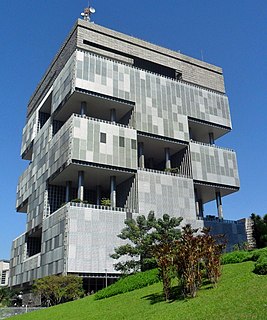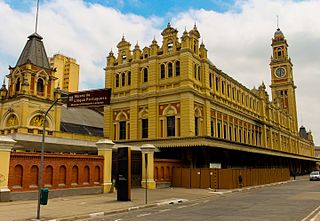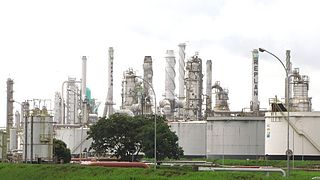
Petróleo Brasileiro S.A., better known by the acronym Petrobras, is a state-owned Brazilian multinational corporation in the petroleum industry headquartered in Rio de Janeiro, Brazil. The company's name translates to Brazilian Petroleum Corporation — Petrobras.
Petrobras 36 (P-36) was at the time the largest floating semi-submersible oil platform in the world prior to its sinking on 20 March 2001. It was owned by Petrobras, a semi-public Brazilian oil company headquartered in Rio de Janeiro. The cost of the platform was US$350 million.
Ipiranga is a Brazilian fuel company and is a subsidiary of Ultra. It is the second-largest Brazilian fuel distribution company, and the largest in the private sector.

The Museum of the Portuguese Language is an interactive Portuguese language—and Linguistics/Language Development in general—museum in São Paulo, Brazil. It is housed in the Estação da Luz railway station, in the urban district of the same name. Three hundred thousand passengers arrive and leave the station every day, and the choice of the building for the launching of the museum is connected to the fact that it was mainly here that thousands of non-Portuguese speaking immigrants arriving from Europe and Asia into São Paulo via the Port of Santos got acquainted with the language for the first time. The idea of a museum-monument to the language was conceived by the São Paulo Secretary of Culture in conjunction with the Roberto Marinho Foundation, at a cost of around 37 million reais.

Betim is a town in Minas Gerais, Brazil. It is located at around 19°58′4″S44°11′52″W. The city belongs to the mesoregion Metropolitan of Belo Horizonte (BH) and to the microregion of Belo Horizonte. It is the fifth largest city in Minas Gerais and one of the 50 largest cities in the Southeast of Brazil.

Brazil is the 10th largest energy consumer in the world and the largest in South America. At the same time, it is an important oil and gas producer in the region and the world's second largest ethanol fuel producer. The government agencies responsible for energy policy are the Ministry of Mines and Energy (MME), the National Council for Energy Policy (CNPE), the National Agency of Petroleum, Natural Gas and Biofuels (ANP) and the National Agency of Electricity (ANEEL). State-owned companies Petrobras and Eletrobras are the major players in Brazil's energy sector, as well as Latin America's.

Ultra is a Brazilian company operating in the sectors of fuel distribution, through Ipiranga and Ultragaz; in the production of specialty chemicals, through Oxiteno; in the storage of liquid bulk, through Ultracargo; and in pharmacies, through Extrafarma, all of which are subsidiaries entirely controlled by Ultrapar holding. The company is publicly traded under the name Ultrapar on São Paulo’s stock exchange (B3) and on New York’s (NYSE).

Centro is a neighborhood in the Central Region of Rio de Janeiro, Brazil. It represents the financial heart of the city, and the crux of the Central Region.

Refinaria de Paulínia or simply REPLAN is a petroleum refinery located in the city of Paulínia in the São Paulo state, in Brazil. REPLAN is the largest refinery of the Brazilian company Petrobras, with a capacity of about 360,000 barrels per day (57,000 m3/d), which accounts for about 20% of Brazilian overall petroleum refining capacity. About 80% of the processed petroleum is produced in Brazil, mostly from the Campos Basin.
The Albacora-Leste Oil Field is an oil field located in Campos Basin. It was discovered in 1986 and developed by Petrobras. The oil field is operated by Petrobras, that owns 90% of the field, while Repsol owns the remaining 10%. The total proven reserves of the Albacora-Leste oil field are around 534 million barrels (72×106tonnes), and production is centered on 180,000 barrels per day (29,000 m3/d). In April 2022, Petro Rio (through its subsidiary Petro Rio Jaguar Petróleo), acquired a 90% operating stake in the Albacora Leste field Petróleo Brasileiro (Petrobras) for $2.2bn USD.

Corruption in Brazil exists on all levels of society from the top echelons of political power to the smallest municipalities. Operation Car Wash showed central government members using the prerogatives of their public office for rent-seeking activities, ranging from political support to siphoning funds from state-owned corporation for personal gain. Specifically, mensalão typically referred to the practice of transferring taxpayer funds as monthly allowances to members of congress from other political parties in consideration for their support and votes in congress. Politicians used the state-owned and state-run oil company Petrobras to raise hundreds of millions of reais for political campaigns and personal enrichment.

Operation Car Wash was a criminal investigation by the Federal Police of Brazil's Curitiba branch. It began in March 2014 and was initially headed by investigative judge Sergio Moro, and in 2019 by Judge Luiz Antônio Bonat. It has resulted in more than a thousand warrants of various types. According to the Operation Car Wash task force, investigations implicate administrative members of the state-owned oil company Petrobras, politicians from Brazil's largest parties, presidents of the Chamber of Deputies and the Federal Senate, state governors, and businessmen from large Brazilian companies. The Federal Police consider it the largest corruption investigation in the country's history.

In 2015 and 2016, a series of protests in Brazil denounced corruption and the government of President Dilma Rousseff, triggered by revelations that numerous politicians allegedly accepted bribes connected to contracts at state-owned energy company Petrobras between 2003 and 2010 and connected to the Workers' Party, while Rousseff chaired the company's board of directors. The first protests on 15 March 2015 numbered between one and nearly three million protesters against the scandal and the country's poor economic situation. In response, the government introduced anti-corruption legislation. A second day of major protesting occurred 12 April, with turnout, according to GloboNews, ranging from 696,000 to 1,500,000. On 16 August, protests took place in 200 cities in all 26 states of Brazil. Following allegations that Rousseff's predecessor, Luiz Inácio Lula da Silva, participated in money laundering and a prosecutor ordered his arrest, record numbers of Brazilians protested against the Rousseff government on 13 March 2016, with nearly 7 million citizens demonstrating.

Marcelo Bahia Odebrecht is a Brazilian businessman and the former CEO of Odebrecht, a diversified Brazilian conglomerate. In March 2016, he was sentenced to 19 years in prison for paying more than $30 million in bribes. The jail sentence was reduced to ten years in prison in December 2016 for paying a fine, admitting guilt and providing evidence to authorities.

Aldemir Bendine was the chief executive officer (CEO) of Petrobras.

Alberto Youssef is a Brazilian black-market banker. He has been implicated in several of Brazil's largest scandals during the past generation. He was a figure in the Banestado scandal, and later was a major target of Operation Car Wash, the official investigation of corruption surrounding Petrobras, the government-controlled oil company.

The 2018 Brazil truck drivers' strike, also called the diesel crisis, was a strike of self-employed truck drivers that began on 21 May 2018.

Patrícia Campos Mello is a Brazilian journalist. She works at Folha de S.Paulo as a news reporter and columnist. In 2020, she received the Maria Moors Cabot Award, from Columbia University. In 2019, she received the International Press Freedom Award from the Committee to Protect Journalists. In 2018, she received the King of Spain International Journalism Award. And in 2020 she was awarded the Ordre National du Mérite by the government of France. In 2016, she received the Troféu Mulher Imprensa award.

A long series of criminal investigations have occurred in Brazil associated with Operation Car Wash. The first investigation was launched in March 2014, and is now known as phase 1 of the investigation, with subsequent inquiries numbered sequentially and having code names such as phase 2, phase 3, and so on. By September 2020, there were 74 announced phases of Operation Car Wash.

The Odebrecht–Car Wash leniency agreement, also known in Brazil as the "end of the world plea deal", was the leniency agreement signed between Odebrecht S.A. and the Public Prosecutor's Office (PGR) in December 2016, as part of Operation Car Wash. The agreement provided for the deposition of 78 of the contractor's executives, including the former president Marcelo Odebrecht, and his father, Emílio Odebrecht, which generated 83 investigations at the Supreme Federal Court (STF).














